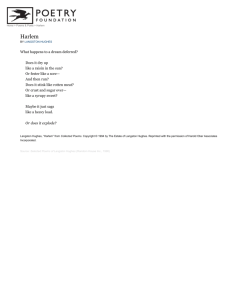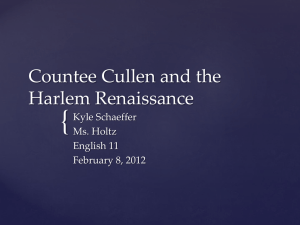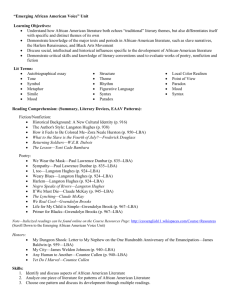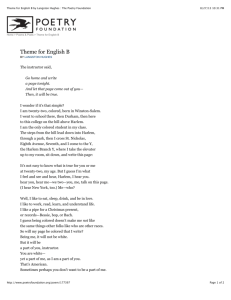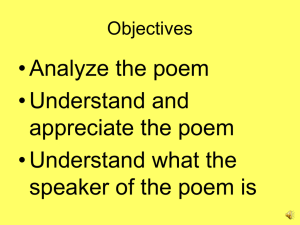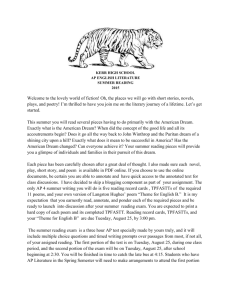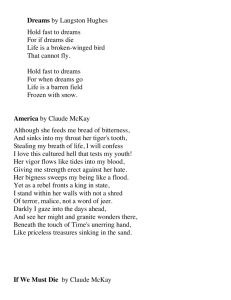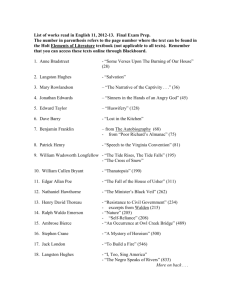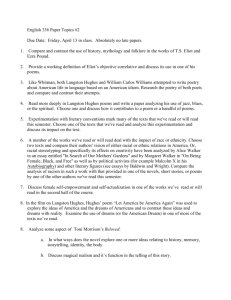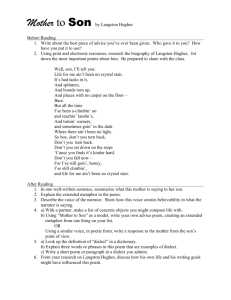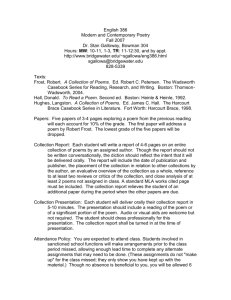Chapter 2: Harlem Renaissance “I, Too” I am the
advertisement
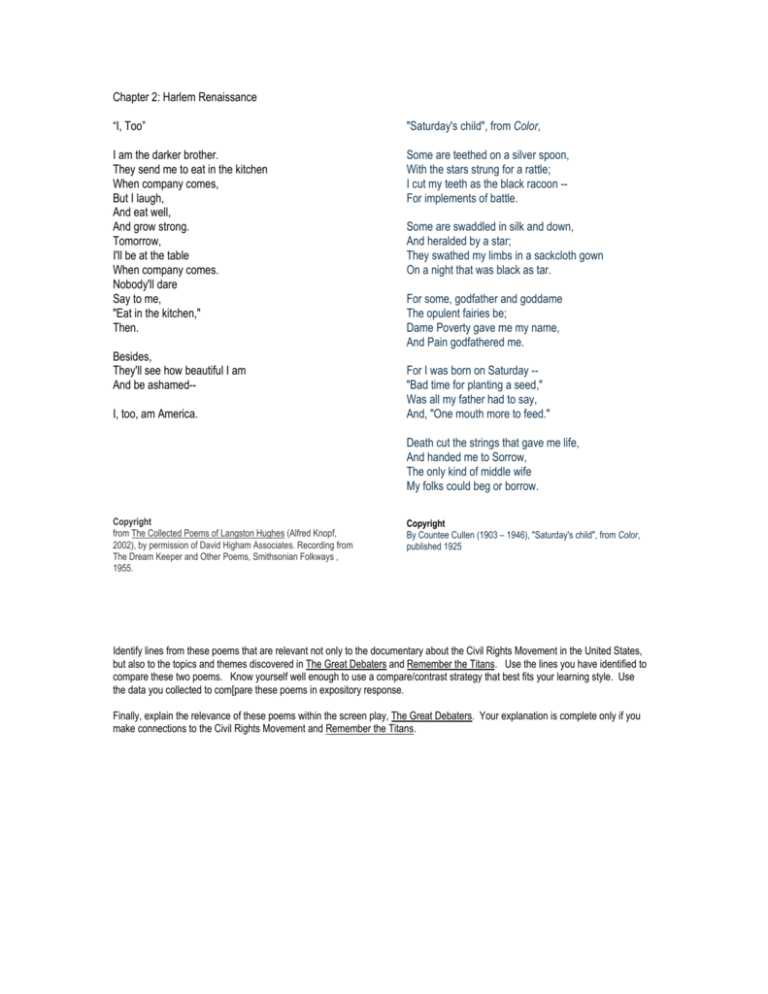
Chapter 2: Harlem Renaissance “I, Too” "Saturday's child", from Color, I am the darker brother. They send me to eat in the kitchen When company comes, But I laugh, And eat well, And grow strong. Tomorrow, I'll be at the table When company comes. Nobody'll dare Say to me, "Eat in the kitchen," Then. Some are teethed on a silver spoon, With the stars strung for a rattle; I cut my teeth as the black racoon -For implements of battle. Besides, They'll see how beautiful I am And be ashamed-I, too, am America. Some are swaddled in silk and down, And heralded by a star; They swathed my limbs in a sackcloth gown On a night that was black as tar. For some, godfather and goddame The opulent fairies be; Dame Poverty gave me my name, And Pain godfathered me. For I was born on Saturday -"Bad time for planting a seed," Was all my father had to say, And, "One mouth more to feed." Death cut the strings that gave me life, And handed me to Sorrow, The only kind of middle wife My folks could beg or borrow. Copyright from The Collected Poems of Langston Hughes (Alfred Knopf, 2002), by permission of David Higham Associates. Recording from The Dream Keeper and Other Poems, Smithsonian Folkways , 1955. Copyright By Countee Cullen (1903 – 1946), "Saturday's child", from Color, published 1925 Identify lines from these poems that are relevant not only to the documentary about the Civil Rights Movement in the United States, but also to the topics and themes discovered in The Great Debaters and Remember the Titans. Use the lines you have identified to compare these two poems. Know yourself well enough to use a compare/contrast strategy that best fits your learning style. Use the data you collected to com[pare these poems in expository response. Finally, explain the relevance of these poems within the screen play, The Great Debaters. Your explanation is complete only if you make connections to the Civil Rights Movement and Remember the Titans. The following lines are relevant not only to the documentary about the Civil Rights Movement in the United States, but also to the topics and themes discovered in The Great Debaters and Remember the Titans. “I. Too” (poet: Langston Hughes) “I am the darker brother.” Consider the following pertinent facts: • this poem was written in 1925 by Langston Hughes, a Harlem Renaissance poet, • The Supreme Court case, Plessy vs. Ferguson, made the Jim Crow South a reality with “separate but equal” • Hughes might be referring to “separate but equal” when he writes, ‘I am the darker brother.” “They send me to eat in the kitchen When company comes, But I laugh, And eat well, And grow strong.” Langston Hughes might be describing “separate but equal” in respect to the routine of an ordinary day. He does so making sure his audience knows the narrator of this poem his fully aware of his position in society. “Tomorrow, I'll be at the table When company comes. Nobody'll dare Say to me, "Eat in the kitchen," Then.” The narrator of this poem by Langston Hughes lives “waiting patiently with hope-filled expectations” as he speaks about the future. However, this line describe the routine of an extraordinary day. “Besides, They'll see how beautiful I am And be ashamed—“ With respect to the beauty of a person, Langston Hughes describes the shame of ignorance. “I, too, am America.” He challenges his audience to see the narrator as part of this country, and not someone who is “separate, but equal.” “Saturday’s Child” (Poet: Countee Cullen) “Some are teethed on a silver spoon, With the stars strung for a rattle; …” “Some are swaddled in silk and down, And heralded by a star; …” “For some, godfather and goddame The opulent fairies be; …” The first two lines of the first three stanzas clearly describe the opulence of some. However, to understand this, you must use your prior knowledge. Countee Cullen is a poet from the Harlem Renaissance. We, the audience, know that this poem, “Saturday’s Child,” was published in 1925. We can use this information and our prior knowledge to gain a deeper understanding of the poem. Consider the following pertinent facts: • this poem was written in 1925 by Countee Cullen, a Harlem Renaissance poet, • The Supreme Court case, Plessy vs. Ferguson, made the Jim Crow South a reality with “separate but equal” “I cut my teeth as the black racoon -For implements of battle. …” “They swathed my limbs in a sackcloth gown On a night that was black as tar. …” “Dame Poverty gave me my name, And Pain godfathered me. …” The second two lines of the first three stanzas clearly describe the plight of an African American in the Jim Crow South. For I was born on Saturday -"Bad time for planting a seed," Was all my father had to say, And, "One mouth more to feed." Death cut the strings that gave me life, And handed me to Sorrow, The only kind of middle wife My folks could beg or borrow. The tone in the last two stanzas in one of “sorrow”
